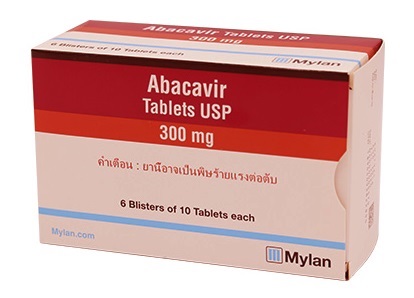Nikhil Prasad Fact checked by:Thailand Medical News Team Apr 11, 2025 1 day, 17 hours, 3 minutes ago
Medical News: A commonly used HIV drug might soon play a surprising role in improving breast cancer treatment. Researchers from Manipal Academy of Higher Education, Kasturba Medical College, All India Institute of Medical Sciences (AIIMS) Bhopal-India, University of Alabama at Birmingham-USA, and the University of Waterloo-UK have discovered that the antiretroviral drug abacavir significantly boosts the cancer-killing power of the chemotherapy drug doxorubicin in breast cancer cells—by targeting a specific cancer-promoting protein known as KDM5B.

This
Medical News report dives into how a well-known antiviral is being repurposed to deliver a one-two punch against one of the most prevalent cancers affecting women today.
KDM5B: The Hidden Driver Behind Breast Cancer Growth
KDM5B is an enzyme that modifies the way genes are read, helping tumors grow and survive. The study found that this enzyme is consistently overproduced in breast cancer tissues, especially in early stages and certain subtypes like luminal and HER2-positive cancers. Public databases and patient samples confirmed these high levels of KDM5B compared to healthy breast tissue.
The overexpression of KDM5B helps tumors evade normal checks on cell growth. Because of its central role in cancer progression, scientists believe that turning off or reducing KDM5B could halt tumor growth or make cancer cells more vulnerable to chemotherapy.
Abacavir Targets KDM5B and Makes Cancer Cells More Sensitive to Doxorubicin
Abacavir, typically used in HIV treatment, turns into an active compound called carbovir triphosphate (CBV-TP) once inside human cells. This molecule was found to dock onto and disrupt KDM5B activity. In lab experiments using breast cancer cell lines (MCF-7 and MDA-MB-231), abacavir reduced the expression of KDM5B and made the cancer cells more susceptible to doxorubicin.
When abacavir was administered before doxorubicin, it lowered the required dose of the chemotherapy drug to kill cancer cells by more than half. In triple-negative breast cancer cells, doxorubicin's effectiveness increased 2.4-fold with abacavir pre-treatment. This is a critical breakthrough since lower doses of doxorubicin mean fewer side effects, especially the well-known risk of heart damage.
Cell Cycle Disruption and Enhanced Cancer Cell Death
The researchers also studied how abacavir and doxorubicin together affect the cancer cell cycle. Abacavir alone caused the cancer cells to stall during the DNA replication phase (S phase), while the combination with doxorubicin forced cells into a more advanced blockade (S/G2 phase) and triggered extensive late-stage apoptosis—a form of programmed cell death. This dual effect cripples the cell's ability to divide and survive.
Real Tumor Models Confirm the Effects
To verify their lab results in a more realistic setting, scientists grew three-dimensional mini-tumors (organoids) from patient breast cancer samples. These organoids mimicked actual tumor behavior in the body. Abacavir combined with doxorubicin led to significant reductions in tum
or size and viability in most of the tested organoids, especially those with a denser structure. This suggests that the treatment may work particularly well in certain genetic or structural tumor subtypes.
Molecular Mechanism Behind the Synergy
The study’s molecular docking simulations revealed that CBV-TP, the active form of abacavir, could directly bind to human DNA polymerase β—an enzyme essential for DNA replication. By integrating into the DNA synthesis process, CBV-TP disrupts cell division, leading to cell cycle arrest and cancer cell death. These findings align with past studies showing that nucleoside analogs like abacavir can damage DNA and overwhelm a cancer cell’s repair mechanisms.
Interestingly, KDM5B is also involved in DNA repair. When abacavir suppresses KDM5B, it weakens the cell’s ability to fix the DNA damage caused by chemotherapy. This sets up a perfect storm inside the cancer cell, leading to enhanced destruction.
Conclusions and Future Directions
This groundbreaking study reveals that abacavir can be repurposed as a valuable partner to doxorubicin in treating breast cancer. By inhibiting KDM5B, abacavir not only hampers cancer cell survival but also sensitizes them to chemotherapy. This combination offers a promising path to reduce chemotherapy doses, limiting the toxic side effects that often harm patients.
While the results are promising, further studies in animal models and clinical trials are necessary to confirm these effects and determine the best patient profiles for such a treatment. Personalized medicine approaches using patient-derived organoids may help fine-tune who would benefit most from this drug combination. If future trials validate these findings, abacavir could join the fight against breast cancer—not just as an antiviral, but as a weapon against one of the most complex cancers affecting women worldwide.
The study findings were published on a preprint server and are currently being peer reviewed.
https://www.researchsquare.com/article/rs-6208718/v1
For the latest on Breast Cancer, keep on logging to Thailand
Medical News.
Read Also:
https://www.thailandmedical.news/news/monensin-shows-potential-to-inhibit-triple-negative-breast-cancer-growth
https://www.thailandmedical.news/news/breaking-sars-cov-2-causes-aggressive-breast-cancer-progression-and-manipulates-tissue-stem-cells-in-the-tumor-microenvironment
https://www.thailandmedical.news/news/jacaric-acid-from-plants-found-to-kill-breast-cancer-cells-and-also-enhances-other-cancer-treatment-protocols
https://www.thailandmedical.news/articles/cancer
https://www.thailandmedical.news/pages/thailand_doctors_listings
